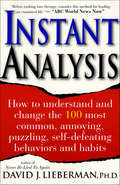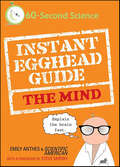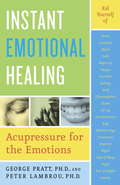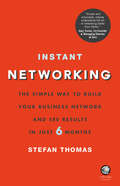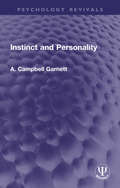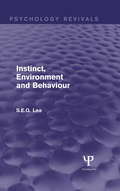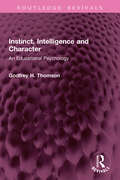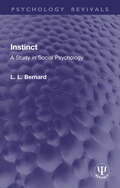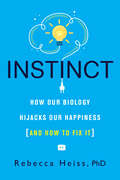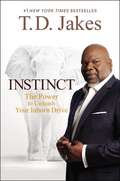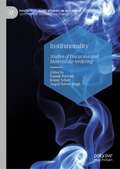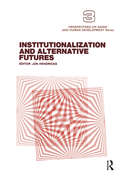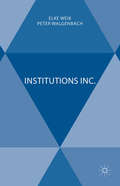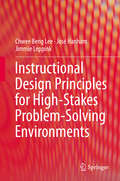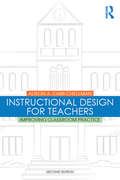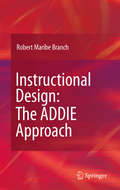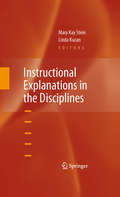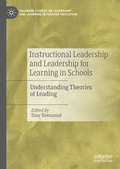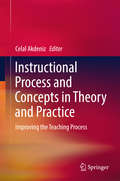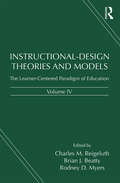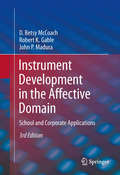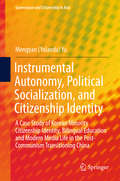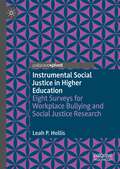- Table View
- List View
Instant Analysis: How To Understand And Change The 100 Most Common, Annoying, Puzzling, Self-defeating Behaviors And Habits
by David J. LiebermanThe New York Times–bestselling author of Mindreader helps you become aware of unhealthy behaviors and beliefs to break free of conditioned living.Have you ever wondered . . . Why am I so easily discouraged?Why do I procrastinate?Why do I stare at myself in the mirror?Why do I keep people waiting?Why do I eat when I am not hungry?Why do I secretly hope other people will fail?Why do I feel alone even when I’m around other people?Why am I constantly misplacing my keys and other things?Why do I enjoy hearing the secrets and confessions of others?Why will I do a favor for someone I don’t even like?Why am I so superstitious?Why do I have trouble asking for help?If any of these behaviors, habits, and thoughts are keeping you from having the life you want, then you need to know that help has finally arrived in David J. Lieberman’s Instant Analysis.“Before rushing into therapy, consider this method for leading an examined life.” —ABC World News Now“While the questions and answers are entertaining, specific practical behaviors are also suggested for creating more positive thinking and actions . . . [a] practical, enjoyable book.” —Library Journal
Instant Egghead Guide: The Mind (Instant Egghead Guides)
by Scientific American Emily AnthesEverything from neurons to consciousness in the blink of an eye (which takes 300 milliseconds).Take a "fantastic voyage" through the whorls and curves of the human brain, no miniaturization required. Learn everything from how quickly you can possibly think (and that left-handed people think faster) to why being bad feels so good (yes, there's a biochemical explanation).Whether you're a fan of Scientific American's wildly popular "60-Second Science" podcast or just curious about science, you're going to love the tingly way your synapses feel after enjoying the same bite-sized knowledge in The Instant Egghead Guide to the Mind.
Instant Emotional Healing: Acupressure for the Emotions
by Peter Lambrou George PrattThis groundbreaking book will show you how to give yourself instant relief from negative emotions. Drawing on a combination of the meridian systems of Eastern acupuncture and Western cognitive ideas, the authors give step-by-step instructions in how to use key pressure points on your body, breathing techniques and focussed thought to overcome such feelings as heartache, loneliness, anger and fear - as well as more specific problems ranging from addictive urges to stage fright.
Instant Networking: The simple way to build your business network and see results in just 6 months
by Stefan ThomasA fresh take on the vital business skill of networking Networking is something that many of us dread and try to avoid at all costs. But no longer the sole remit of sales people, it has become a vital business skill for us all. Expected to negotiate effectively through our careers, social lives and online presence, networking 24/7 has become a real challenge. Many experts believe that you need to be super confident or a brilliant presenter in order to network to the best of your ability but networking has changed. Let Stefan Thomas show you how to take a fresh look at Networking 2.0 and teach you how networking is no longer just something we do with other people and it's no longer an activity, it's a new way of thinking and acting. Instant Networking will show you how to build networking into all that you do, whether you're self-employed, fresh out of education and ready to take on the world or just ready to make your presence known. Learn how to: Combine networking, social media, marketing, and sales skills to give a full picture of how to network effectively Explore how to establish your personal brand Build networking into your existing day-to-day activities Deal with the key challenges people face at networking events
Instead of Therapy: Help Yourself Change and Change the Help You're Getting
by D. Patrick Miller Tom RuskThe book examines alternatives to psychotherapy.
Instinct and Personality (Psychology Revivals)
by A. Campbell GarnettOriginally published in 1928, the principle aim of this book was to present and apply an original viewpoint in psychology. The work is substantially that of a thesis on "The Problem of Personality in the Light of Recent Psychology" for which the author was awarded the degree of Doctor of Letters in the University of Melbourne in 1925. Today it can be read and enjoyed in its historical context.
Instinct, Environment and Behaviour (Psychology Revivals)
by Stephen LeaWhat can the evolution of animal behaviour tell us about human behaviour? More specifically, how good an account of animal behaviour can we give in terms of evolution, and how do humans fit in with or deviate from the pattern established for other animals? The biological approach to the study of animal behaviour has important implications for psychology, but it is distinctly different. Originally published in 1984, this book provides a basic introduction to biological theories about behaviour, from the classic ethological tradition of Lorenz and Tinbergen to the later sociobiological approach. The principles of experimentation and research involved are assessed critically, especially with regard to their implications for the study of human behaviour. Written specifically for those with little biological knowledge, this book will still be of interest to students of biology and introductory psychology alike.
Instinct, Intelligence and Character: An Educational Psychology (Routledge Revivals)
by Godfrey H. ThomsonFirst published in 1924, Instinct, Intelligence and Character provides a lucid and forcible account of the currents of thought in educational psychology, from intelligence tests to psychoanalysis, from character training to the laws of learning. It brings themes such as talk on instincts and habits; laws of heredity; nature of satisfaction and dissatisfaction; the learning process; interests and prejudices; individual differences in intellect; general and special abilities; differences in will and temperament; and the wings of thought. This historical reference work is useful for teachers and students of educational psychology.
Instinct: A Study in Social Psychology (Psychology Revivals)
by L. L. BernardOriginally published in 1925, according to the preface, Instinct: A Study in Social Psychology is the result of many years of interrupted labors that began in a graduate seminar in 1909–1910, when the author attempted to apply Professor McDougall’s classification of instincts to the classification of criminals. The immediate result was the conviction that McDougall’s instincts were habits, and further constructive work found issue in an unpublished report on “Instinct and the Social Sciences,” taking issue with McDougall’s viewpoint regarding the significance of the theory of instincts then prevalent for the social sciences. Finally completed after many years in the making, this work is the result of the author’s investigations on the topic of instinct. Today it can be read in its historical context.This book is a re-issue originally published in 1925. The language used and views portrayed are a reflection of its era and no offence is meant by the Publishers to any reader by this re-publication.
Instinct: Rewire Your Brain with Science-Backed Solutions to Increase Productivity and Achieve Success
by Rebecca HeissA revolutionary approach to unlockingyour innate ability to achieve success in business and in life.Why do we constantly feel overwhelmed by stress, dissatisfied in our careers and relationships, and lacking in real purpose? Why do we seem to sabotage ourselves, hampering our productivity and success? The answer lies in our instincts . . . In every area of life, from business to relationships to health, we act on outdated instincts that were built to help us survive a world ruled by scarcity and danger. But in today&’s world, those same instincts stop us from succeeding in the environment in which we actually live: a diverse world of abundant choices, and almost limitless connections. Now evolutionary biologist Dr. Rebecca Heiss offers a new approach that harnesses the power of our instincts, and redirects them to work for us rather than against us. Dr. Heiss reveals the science behind our self-sabotaging behaviors, then provides simple, actionable techniques that can rebuild our instinctive minds. Both practical and inspiring, Instinct is a roadmap that anyone can use to finally stop living on autopilot, improve productivity and happiness, and consciously craft a better life.
Instinct: The Power To Unleash Your Inborn Drive
by T. D. JakesAn instant #1 New York Times bestseller for six weeks, Bishop T. D. Jakes's smash-hit INSTINCT shows readers how to tap into their God-given intuition to achieve ultimate success. Whether you call it following your heart, a gut feeling, a hunch or intuition, instinct-the inner knowledge bubbling up from a wellspring of wisdom within-can lead to a bigger, elephant-sized life. Combining social, business and personal examples with biblical insights, in INSTINCT Bishop Jakes shows readers how to rediscover their natural aptitudes and reclaim the wisdom of their past experiences. Knowing when to close a deal, when to take a risk, and when to listen to their hearts will become possible when they're in touch with the instincts that God gave them. If readers are ready to unlock the confines of where they are, and discover where they were meant to be, then INSTINCT is their key!
Institutionality: Studies of Discursive and Material (Re-)ordering (Postdisciplinary Studies in Discourse)
by Yannik Porsché Ronny Scholz Jaspal Naveel SinghThis edited book brings together humanities and social sciences scholars from the various disciplines at the nexus of discourse studies and ethnography to reflect on questions of institutional practices and their political concerns. Institutional order plays an important role in structuring power relations in society. Yet, contrary to common understandings of structure, institutional orders are far from fixed or stable. They constantly change, and they are resisted and reimagined by social actors. The 20 studies collected in this edited volume develop the notion of institutionality as an overarching perspective to explore how institutional actors and institutional practices order and reorder power in societies across the globe. Thereby the chapters pay special attention to the fluidity, volatility, fragility, and ambiguity of order, and consequently to its claims to authority. Employing a broad range of discourse analytic and ethnographic methodologies, the studies show how institutions are discursively and materially constructed, defined, represented and how they are made relevant and become powerful – or how they are resisted, transformed or lose significance – in interaction. Readers will obtain nuanced insights into ways in which differently positioned social actors engage in struggles about how institutions can be imagined and enacted across several domains, such as workplace interactions, architecture, mass-media representations or organisational publicity. This book will be of interest to readers in Applied Linguistics, Discourse and Society, Critical Discourse Analysis, Political Theory and Communication Studies.
Institutionalization and Alternative Futures (Perspectives On Aging And Human Development Ser.)
by Jon HendricksNo one wants to put an aging relative in a "home." But very few people have an understanding of the issues involved and options available for an older person who needs outside care. This important book offers a variety of new insights into ways of maximizing choice, independence, and well-being, and minimizing the emotional stunting often associated with institutionalization. Both imaginative institutional programs and such alternatives as community maintenance are examined.
Institutions Inc.
by Peter Walgenbach Elke WeikInstitutions Incorporated draws together aspects of human and organizational corporeality and links them to institutions. Throughout European anthropology and culture the body has been conceptualized as the 'dark side' to soul and reason. This book explores the 'dark side' of institutions, their materiality and the bodily involvement of their users, in an environment where perfection is measured in intangible entities, notably reason and will. This innovative collection takes a closer look at the interplay of the symbolic and the material, and the triad of institutions, bodies and corporations. This exciting research examines what the tangible, 'dark side' of institutions means both for those who live in them, and those who study them.
Instructional Design Principles for High-Stakes Problem-Solving Environments
by Chwee Beng Lee José Hanham Jimmie LeppinkThis book examines the types of problems and constraints faced by specialists in the areas of security, medicine, mental health, aviation and engineering. Every day we rely on highly trained specialists to solve complex problems in high-stakes environments, that is, environments involving direct threats to the preservation of human life. While previous work has tended to focus on problem solving in a single domain, this book covers multiple, related domains. It is divided into three parts, the first of which addresses the theoretical foundations, with coverage of theories of instructional design and expertise. Part two covers the five high-stakes domains and offers directions for training in these domains. In turn, part three provides practical guidelines for instructional design in high-stakes professions, including learner analysis, task analysis, assessment and evaluation. The book is intended for a broad readership, including those who operate in high-stress, time-pressure occupations. Trainers at professional organisations can utilise the theoretical frameworks and training strategies discussed in this book when preparing their clients for complex, real-world problem solving. Further, the book offers a valuable resource for academics and graduate students, as well as anyone with an interest in problem solving.
Instructional Design for Teachers: Improving Classroom Practice
by Alison A. Carr-ChellmanInstructional Design for Teachers, Second Edition focuses on the instructional design (ID) process specifically for K-12 teachers. The first edition introduced a new, common-sense model of instructional design to take K-12 teachers through the ID process step by step, with a special emphasis on preparing, motivating, and encouraging new and ongoing use of ID principles. This second edition includes new material on design in gaming, cybercharters, online classrooms, and flipped classrooms, as well as special considerations for the Common Core. Each chapter contains framing questions, common errors, easy-to-use rules of thumb, clearly stated outcomes, and examples showing ID in action. The basic model and its application within constructivism and user-design will help teachers adapt from a behavioral approach to a more open, student-centered design approach. Combining basics with strategies to implement this model in the most advanced instructional approaches, this book empowers teachers and learners to use good instructional design with the most recent research-based approaches to learning. Instructional Design for Teachers shows how ID principles can impact instructional moments in positive and practical ways. The book can be used for basic ID courses and introductory curriculum courses, and is accessible to in-service as well as pre-service teachers.
Instructional Design: The ADDIE Approach
by Robert Maribe BranchThe Analyze, Design, Develop, Implement, and Evaluate (ADDIE) process is used to introduce an approach to instruction design that has a proven record of success. Instructional Design: The ADDIE Approach is intended to serve as an overview of the ADDIE concept. The primary rationale for this book is to respond to the need for an instruction design primer that addresses the current proliferation of complex educational development models, particularly non-traditional approaches to learning, multimedia development and online learning environments. Many entry level instructional designers and students enrolled in related academic programs indicate they are better prepared to accomplish the challenging work of creating effective training and education materials after they have a thorough understanding of the ADDIE principles. However, a survey of instructional development applications indicate that the overwhelming majority of instructional design models are based on ADDIE, often do not present the ADDIE origins as part of their content, and are poorly applied by people unfamiliar with the ADDIE paradigm. The purpose of this book is to focus on fundamental ADDIE principles, written with a minimum of professional jargon. This is not an attempt to debate scholars or other educational professionals on the finer points of instructional design, however, the book's content is based on sound doctrine and supported by valid empirical research. The only bias toward the topic is that generic terms will be used as often as possible in order to make it easy for the reader to apply the concepts in the book to other specific situations.
Instructional Explanations in the Disciplines
by Linda Kucan Mary Kay SteinIn today's climate of accountability and standards, increasing attention is focused on teacher "quality," with less emphasis on what teachers actually do to interest and engage students in learning. This path-breaking volume addresses this research problem with a clear definition and a content-specific analysis of the most essential teaching moment--the instructional explanation--for vital new perspectives on educational method and process. Rich in examples from science, mathematics, and the humanities, Instructional Explanations in the Disciplines explores a variety of interactive contexts for teaching and learning, which may be collaborative between teachers, students, and others, performed in non-classroom settings, or assisted by technology. The book's subject-matter-specific framework reveals key elements in the process, such as carefully examining the question to be answered, making connections with what is already known, and developing examples conducive to further understanding. Instructional Explanations in the Disciplines is a valuable addition to the education library, giving researchers new methods of unpacking educational process as few books before it.
Instructional Leadership and Leadership for Learning in Schools: Understanding Theories of Leading (Palgrave Studies on Leadership and Learning in Teacher Education)
by Tony TownsendThis book offers a nuanced understanding of how two different theories of leadership can be applied to achieve better results within schools. These leadership theories – Instructional Leadership and Leadership for Learning – have assisted our recent understanding of school leadership. This book interrogates the theories themselves as well as their impact on education systems around the world. It also looks at how they can be practically applied to educate school leaders within their schools and beyond, building partnerships with families, schools and other community agencies serving students. In doing so, the book considers the possibility that these theories are not opposed, but two sides of the same coin. Both are underpinned by the question ‘how do we provide the best educational experience for students?’. The answer to this question will determine the way leaders go about the task of leading schools. This important book will be of interest and value to students and scholars of educational leadership, as well as educational leaders themselves.
Instructional Process and Concepts in Theory and Practice: Improving the Teaching Process
by Celal AkdenizThis book offers an accessible, practical and engaging guide that provides sample instructional activities supported by theoretical background information, with a focus on the nature of the instructional process in relation to several variables. It approaches instructional models, strategies, methods, techniques, tactics and planning from a new perspective and shares effective tips to help readers better understand the instructional process and its theoretical elements. The book addresses the following questions:What is the nature of the instructional process?What are the classifications of contemporary models and strategies developed within the instructional process?Which groups yield the most effective methods and techniques, and how can they best be practically implemented?What are the instructional tactics teachers need to take into consideration, in which groups are they collected, and which tips can help us employ each tactic?Additionally, readers can adapt the book’s ready-to-use sample activities to their own educational settings. Overall, this book offers an enlightening discussion on contemporary practices related to the teaching process, a broad and holistic theoretical framework, and an ideal reference source for all students and scholars who are interested in the educational sciences.
Instructional-Design Theories and Models, Volume IV: The Learner-Centered Paradigm of Education
by Charles M. Reigeluth, Brian J. Beatty, and Rodney D. MyersInstructional-Design Theories and Models, Volume IV provides a research-based description of the current state of instructional theory for the learner-centered paradigm of education, as well as a clear indication of how different theories and models interrelate. Significant changes have occurred in learning and instructional theory since the publication of Volume III, including advances in brain-based learning, learning sciences, information technologies, internet-based communication, a concern for customizing the student experience to maximize effectiveness, and scaling instructional environments to maximize efficiency. In order to complement the themes of Volume I (commonality and complementarity among theories of instruction), Volume II (diversity of theories) and Volume III (building a common knowledge base), the theme of Volume IV is shifting the paradigm of instruction from teacher-centered to learner-centered and integrating design theories of instruction, assessment, and curriculum. Chapters in Volume IV are collected into three primary sections: a comprehensive view of the learner-centered paradigm of education and training, elaborations on parts of that view for a variety of K-12 and higher education settings, and theories that address ways to move toward the learner-centered paradigm within the teacher-centered paradigm. Instructional-Design Theories and Models, Volume IV is an essential book for anyone interested in exploring more powerful ways of fostering human learning and development and thinking creatively about ways to best meet the needs of learners in all kinds of learning contexts.
Instructional-Design Theories and Models, Volume IV: The Learner-Centered Paradigm of Education
by Charles M. Reigeluth, Brian J. Beatty, and Rodney D. MyersInstructional-Design Theories and Models, Volume IV provides a research-based description of the current state of instructional theory for the learner-centered paradigm of education, as well as a clear indication of how different theories and models interrelate. Significant changes have occurred in learning and instructional theory since the publication of Volume III, including advances in brain-based learning, learning sciences, information technologies, internet-based communication, a concern for customizing the student experience to maximize effectiveness, and scaling instructional environments to maximize efficiency.In order to complement the themes of Volume I (commonality and complementarity among theories of instruction), Volume II (diversity of theories) and Volume III (building a common knowledge base), the theme of Volume IV is shifting the paradigm of instruction from teacher-centered to learner-centered and integrating design theories of instruction, assessment, and curriculum. Chapters in Volume IV are collected into three primary sections: a comprehensive view of the learner-centered paradigm of education and training, elaborations on parts of that view for a variety of K-12 and higher education settings, and theories that address ways to move toward the learner-centered paradigm within the teacher-centered paradigm. Instructional-Design Theories and Models, Volume IV is an essential book for anyone interested in exploring more powerful ways of fostering human learning and development and thinking creatively about ways to best meet the needs of learners in all kinds of learning contexts.
Instrument Development in the Affective Domain
by D. Betsy Mccoach John P. Madura Robert K. GableWhether the concept being studied is job satisfaction, self-efficacy, or student motivation, values and attitudes--affective characteristics--provide crucial keys to how individuals think, learn, and behave. And not surprisingly, as measurement of these traits gains importance in the academic and corporate worlds, there is an ongoing need for valid, scientifically sound instruments. For those involved in creating self-report measures, the completely updated Third Edition of Instrument Development in the Affective Domain balances the art and science of instrument development and evaluation, covering both its conceptual and technical aspects. The book is written to be accessible with the minimum of statistical background, and reviews affective constructs from a measurement standpoint. Examples are drawn from academic and business settings for insights into design as well as the relevance of affective measures to educational and corporate testing. This systematic analysis of all phases of the design process includes: Measurement, scaling, and item-writing techniques.Validity issues: collecting evidence based on instrument content.Testing the internal structure of an instrument: exploratory and confirmatory factor analyses. Measurement invariance and other advanced methods for examining internal structure.Strengthening the validity argument: relationships to external variables. Addressing reliability issues. As a graduate course between covers and an invaluable professional tool, the Third Edition of Instrument Design in the Affective Domain will be hailed as a bedrock resource by researchers and students in psychology, education, and the social sciences, as well as human resource professionals in the corporate world.
Instrumental Autonomy, Political Socialization, and Citizenship Identity
by Mengyan Yolanda YuThis book offers essential insights into Chinese Korean minority youth citizenship identity development during their high school and university education period out of their political socialization experience. It investigates how they develop their citizenship identity with the state through bilingual education and media exposure, as an outcome of the entangled relationship between state power and economic globalization. The book demonstrates to readers how to apply the abstract conceptual framework of identity politics and ideology construction, nurtured by both civil culture and political evolvement, to a specific case with operationalized measurement extracted from political socialization concepts so as to understand and rationalize identity development. This approach offers both an in-depth way to penetrate further in the discourse construction that shapes identity politics and an innovative means of measuring and explaining relevant relationships.
Instrumental Social Justice in Higher Education: Eight Surveys for Workplace Bullying and Social Justice Research
by Leah P. HollisThis book offers eight validated instruments on workplace bullying to support robust mixed methods approaches for social justice research. Workplace bullying is an excellent starting point from which scholars can consider social justice research. The data shows that marginalized and disenfranchised groups (minoritized groups, women, junior faculty, and the LGBTQ+ community) are disproportionately affected. The outcomes included career interruption and severe health disparities. Though there is a demand for workplace bullying instruments, the book also lays a foundation for creating surveys to address these populations more effectively.
